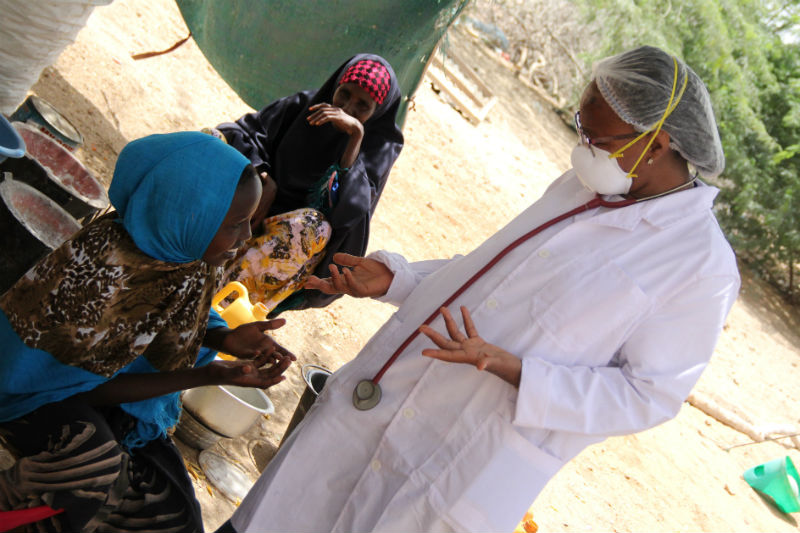In Pursuit of Happiness
“I long for the day my country will be stable, I wish for peace, stability. I wish for the day children and their parents and grandparents can come out to the streets to sing and dance without fear of the militia or army beating and killing us,” says John, albeit in a pensive tone of voice.
“I am extremely happy to be getting this opportunity to start afresh in the United States of America, after all that I have gone through. I never thought I would see this day, I will maximize on the opportunity to one day bring peace back in my country," he continues.
John arrived in Kenya in August of 2010 by road through the Malaba, the Kenya-Uganda border. Prior to this he lived in Mbarara located in the Western Region of Uganda. When he arrived in Nairobi, he was received by a Kenyan man who was aware of his arrival and immediately took him to the suburb of Kasarani.
“Here I met very many of my countrymen who had lived here as refugees and I was happy. Although I did not speak or understand Kiswahili, most of the people there understood English. I felt at home and I felt safe.”
Hoping for More…
In 2012, John received a call from IOM requesting him to come for medical examinations as is standard procedure when undergoing resettlement. He took this as a sign that he was about to start a new journey, a new chapter in his life. Filled with confidence he made his way to the Migration Health Assessment Center in Nairobi. He was strong and healthy and nothing was going to deter him from achieving his goals.
When his x-ray results came back they revealed scars on his lungs and the sputum tested positive for Multi Drug Resistant Tuberculosis (MDR-TB). “I saw death staring at me in the eye, I thought to myself, this is it, finally the devil has caught up with me,“ says John, lowering his voice. In North Kivu, where John comes from, they have an expression ‘igituntu cy’omumaraso’ which means TB is in the blood and cannot be cured; one’s only fate is death.
“I thought of all I was hoping to achieve and now this. I honestly regretted wanting to go abroad; had I not been to IOM I would not have known about all this.” John did not show signs of suffering from TB, he was not coughing and had no fever. He, however, had lost his appetite and consequently lost a lot of weight - something he associated with stress, especially the lack of an income.
This marked the beginning of over 2 years (a 48-month) journey in IOM’s MDR-TB clinic in Dadaab. Through the support of the team at the clinic John was able to finish his treatment and proceed with the resettlement process.

Dr. Damaris Miriti consulting with a TB patient at the MDRTB clinic in Dadaab.
The Doctor’s Diary: Dr. Damaris Miriti
After more than 15 years of engaging with TB patients’ care both in the public and private sector I have had heart-rending moments, I am grateful for those that have succeed to share experiences that encourage.
John is a source of encouragement for me personally and the IOM team at large to continue our diligent service to migrants and more so those who encounter seemingly insurmountable challenges. At the start of my journey with John that spanned nearly 3 years, I met a pleasant and seemingly positive young man with a well-anchored source of strength in his faith in God. He had to move to the refugee camp due to lack of social support in Nairobi. A few months down the road on his MDR-TB treatment IOM had to bring in support from our psychiatrist and counselling team. John was experiencing severe mental ill health, an adverse effect of some of his TB medications. He was out of the ward and it was a month later by the time he was well again to resume his adjusted medication.
As this storm settled another was brewing. Severe gastric-related adverse effects brought us to another halt. John could barely get anything down his throat, neither food nor the medicines; he vomited them all, he vomited blood, and he lost more weight. “Try, John, and eat whatever little you can,” I begged, knowing very well that the available food was not easily palatable, more so for a very ill person. “You need not remind me, I desire to live and I am trying but it just won’t go down,” whispered John in response. He was weak, and I was desperate. IOM arranged to deliver a specially cooked meal with the help of a fellow patient’s minder in the ward. Other patients, the staff in the ward rallied to encourage and support John.
On my next visit and review John had successfully completed his 20 months of prescribed MDR-TB therapy, was cured, and had regained so much weight - a strong and cheerful man met me on that day. Anyone with genuine desire and commitment to care, manage and end TB cannot afford to ignore the psychosocial support as a mandatory component of the care package alongside the TB medicines and more so for MDR/XDR-TB patients. If we care enough, we will do more and do better, we overcome the challenges; have more success stories….End TB.
John is now fully healed, remained well at his last medical check and he departed for Denver, Colorado in the United States on 26 July 2015.